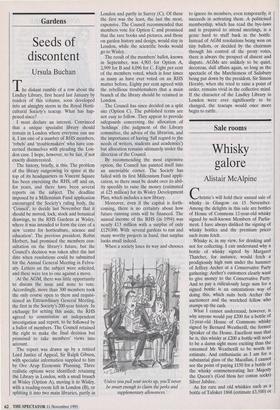Gardens
Seeds of discontent
Ursula Buchan
The distant rumble of a row about the Lindley Library, first heard last January by readers of this column, soon developed into an almighty storm in the Royal Horti- cultural Society's teacup. What has hap- pened since?
I must declare an interest. Convinced that a unique specialist library should remain in London where everyone can use it, I am one of a number of RHS members, `rebels' and 'troublemakers' who have con- cerned themselves with pleading the Lon- don case. I hope, however, to be fair, if not exactly disinterested.
The history, briefly, is this. The problem of the library outgrowing its space at the top of its headquarters in Vincent Square has been exercising the RHS, off and on, for years, and there have been several reports on the subject. The deadline imposed by a Millennium Fund application encouraged the Society's ruling body, the `Council', to decide last November that it should be moved, lock, stock and botanical drawings, to the RHS Gardens at Wisley, where it was intended to form the core of a new 'centre for horticulture, science and education'. The previous president, Robin Herbert, had promised the members con- sultation on the library's future, but the Council's decision was taken after the last date when resolutions could be submitted for the Annual General Meeting in Febru- ary. Letters on the subject were solicited, and these were ten to one against a move.
At the AGM, there was little opportunity to discuss the issue and none to vote. Accordingly, more than 300 members took the only course open to them and requisi- tioned an Extraordinary General Meeting, the first in the Society's 200-year history. In exchange for setting this aside, the RHS agreed to commission an independent investigation and report, to be followed by a ballot of members. The Council retained the right to make the final decision but promised to take members' views into account.
The report was drawn up by a retired Lord Justice of Appeal, Sir Ralph Gibson, with specialist information supplied to him by Ove Arup Economic Planning. Three realistic options were identified: retaining the Library in London, with a small branch at Wisley (Option A), moving it to Wisley, with a reading-room left in London (B), or splitting it into two main libraries, partly in London and partly in Surrey (C). Of these the first was the least, the last the most, expensive. The Council recommended that members vote for Option C and promised that the rare books and pictures, and those on garden history and design, would stay in London, while the scientific books would go to Wisley.
The result of the members' ballot, known in September, was 4,903 for Option A, 2,909 for B and 8,096 for C. Eight per cent of the members voted, which is four times as many as have ever voted on an RHS matter before. Eighty per cent agreed with the rebellious troublemakers that a main branch of the library should be retained in London.
The Council has since decided on a split site (Option C). The published terms are not easy to follow. They appear to provide safeguards concerning the allocation of `holdings' (the judgment of the Library committee, the advice of the librarian, and the importance of having 'full regard to the needs of writers, students and academics') but allocation remains ultimately under the direction of the Council.
By recommending the most expensive option, the Council has painted itself into an unenviable corner. The Society has failed with its first Millennium Fund appli- cation, so there must be doubt over its abil- ity speedily to raise the money (estimated at £25 million) for its Wisley Development Plan, which includes a new library.
Moreover, even if the capital is forth- coming, there is no certainty about how future running costs will be financed. The annual income of the RHS (in 1994) was nearly £13 million with a surplus of only £129,000. With several gardens to run and many worthy projects in hand, that surplus looks small indeed.
When a society loses its way and chooses `Unless you pull your socks up, you'll never be smart enough to claim the perks and supplementary allowances.' to ignore its members, even temporarily, it succeeds in activating them. A politicised membership, which has read the bye-laws and is prepared to attend meetings, is a genie hard to stuff back in the bottle. Instead of AGM resolutions being won on tiny ballots, or decided by the chairman through his control of the proxy votes, there is always the prospect of dissent and dispute. AGMs are unlikely to be quiet, decorous, dull affairs again, so long as the spectacle of the Marchioness of Salisbury being put down by the president, Sir Simon Homby, when she tried to raise a point of order, remains vivid in the collective mind. If the character of the Lindley Library in London were ever significantly to be changed, the teacups would once more begin to rattle.


















































































 Previous page
Previous page